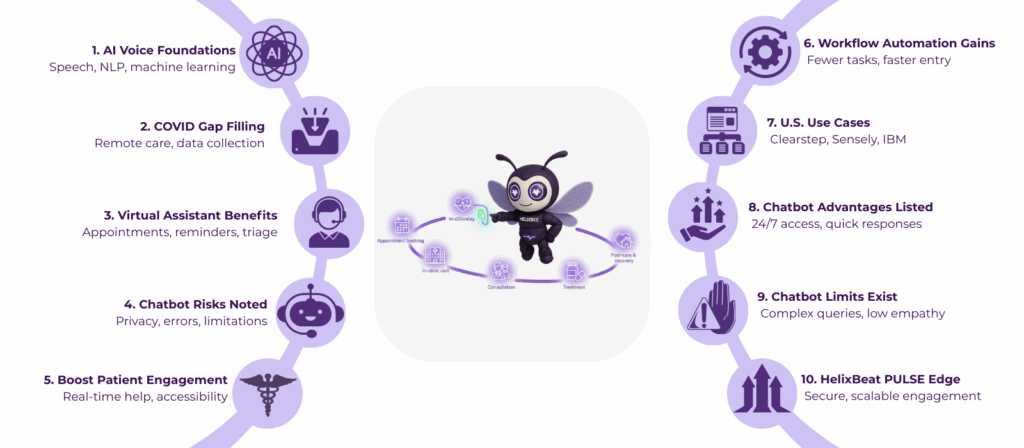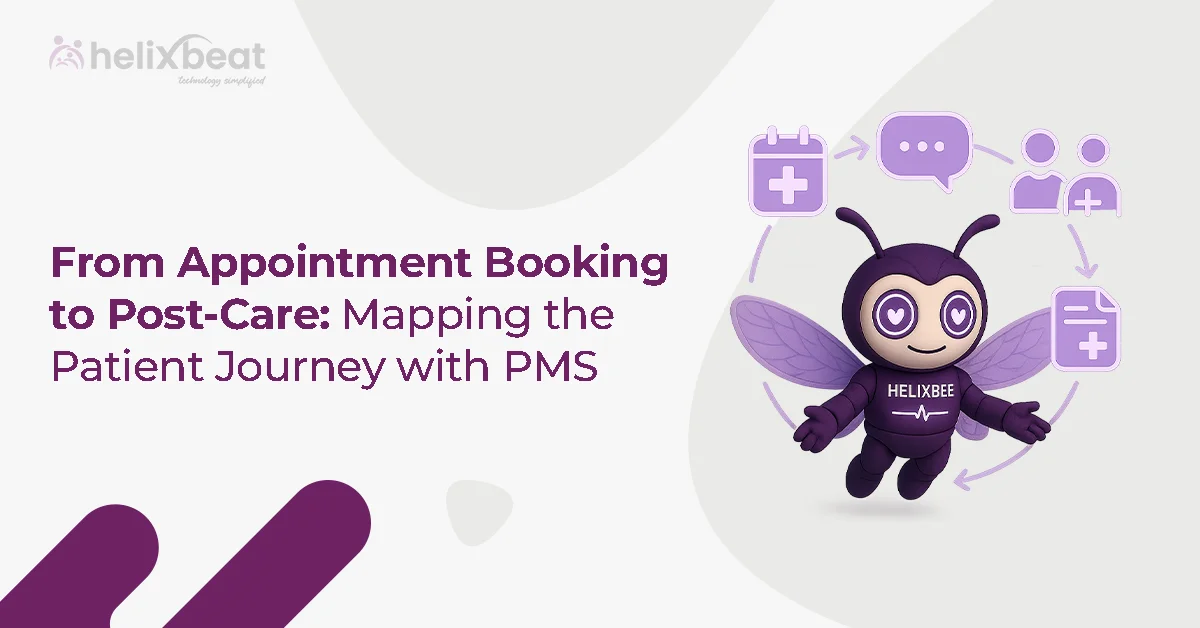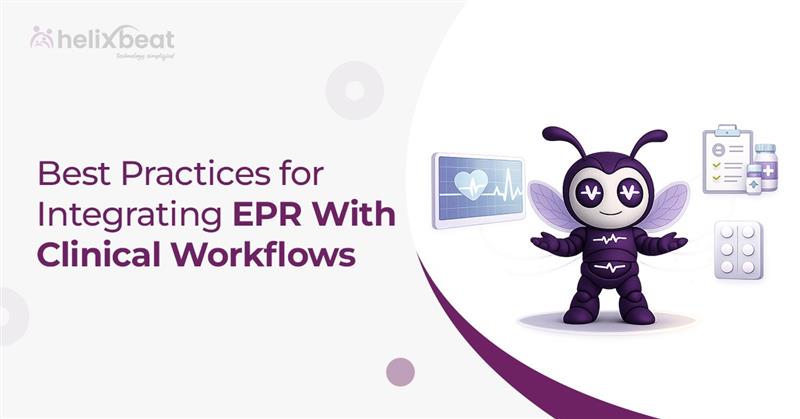Patient management software plays a critical role in optimizing the entire patient journey, from appointment booking to post-care follow-up. In today’s fast-paced healthcare environment, providing a seamless and personalized experience is essential for improving patient satisfaction and care products. By utilizing advanced features like appointment scheduling, automated reminders, and real-time communication, patient management software ensures that every touchpoint of the patient’s journey is smooth and efficient.
The integration of patient engagement software within these systems further enhances communication, keeping patients informed and engaged throughout their care process. This not only boosts operational efficiency but also helps healthcare providers build stronger relationships with their patients, reducing administrative burdens while improving care quality.
Table of Contents
Why Mapping the Patient Journey Matters
Mapping the patient journey is crucial because it allows healthcare providers to understand and optimize every step a patient takes, from first contact to post-care. By visually mapping out the journey, providers can identify key touchpoints where patient engagement can be improved and administrative processes can be streamlined.
When a patient management software is used to map this journey, it helps in creating a seamless experience for patients. This enables providers to address pain points, such as long wait times, missed appointments, or inadequate communication, proactively. By offering timely reminders, personalized follow-ups, and easy access to care information, healthcare organizations can cultivate stronger patient relationships and improve the overall patient experience.
Moreover, mapping the patient journey helps healthcare providers improve operational efficiency, reduce costs, and enhance the quality of care. It enables providers to allocate resources better, automate tasks, and offer a more coordinated approach to patient management. Ultimately, when a provider maps the patient journey, they can deliver more effective, patient-centered care, leading to improved outcomes and greater patient satisfaction.

How Patient Management Software Streamlines Appointment Booking
Here’s how it works:
- 24/7 Accessibility for Patients: Patients can book, reschedule, or cancel appointments at any time via an online portal or mobile app, making the process more flexible and convenient.
- Real-Time Availability: The software provides real-time updates on available time slots, allowing patients to book appointments instantly without waiting for office hours.
- Automated Appointment Reminders: Reduce no-shows by sending automated reminders via text, email, or push notifications, keeping patients informed and on track.
- Integration with EHR Systems: Appointment details are automatically synced with the Electronic Health Records (EHR) system, ensuring accurate patient data and reducing manual entry errors.
- Eliminating Phone Calls and Wait Times: By moving appointment scheduling online, patient management software eliminates long wait times on the phone and reduces administrative staff workload.
- Easy Follow-Ups and Rescheduling: The software facilitates seamless rescheduling of appointments in the event of cancellations and ensures smooth follow-ups for ongoing patient care.
- Personalized Experience: Patients can book appointments tailored to their preferences (e.g., specific doctor, location, time), ensuring a personalized and efficient experience.
See how patient management software can streamline your patient journey. Book a Free Demo
Enhancing Patient Engagement with Patient Engagement Software
Patient engagement software plays a crucial role in strengthening the relationship between healthcare providers and patients. By providing personalized, timely, and effective communication, it helps create a seamless care experience. Here’s how patient engagement software can enhance patient engagement across the patient journey:
- Personalized Communication
Patient engagement software allows providers to send tailored messages to patients, including appointment reminders, medication instructions, and follow-up care reminders. Personalized communication improves the likelihood of patients adhering to their care plans.
- Automated Reminders and Notifications
Automated reminders for appointments, medication adherence, and health screenings ensure that patients stay on track with their healthcare plans. This reduces no-show rates and improves patient compliance.
- Educational Content Delivery
By sending targeted health education materials, patient engagement software empowers patients with the knowledge they need to manage their health conditions. This encourages proactive care and informed decision-making.
- Real-Time Updates
Keep patients informed with real-time updates on test results, changes in appointments, or treatment plans. Instant communication through SMS, email, or app notifications enhances patient satisfaction and reduces anxiety.
- Access to Care Information
Allow patients to access their medical records, lab results, and treatment plans through a secure patient portal. Easy access to this information increases trust and patient engagement, enabling them to participate in their care actively.
- Improved Communication Channels
Patient engagement software offers various communication channels such as secure messaging, chatbots, and voice assistants, allowing patients to reach out for questions or concerns easily. This open communication helps build strong relationships and ensures patients feel supported.
- Patient Feedback Collection
Collecting feedback through surveys and ratings allows providers to understand patient needs and improve care quality. Engaged patients are more likely to provide valuable feedback, which helps healthcare organizations enhance their services.
Managing Patient Communication Throughout the Care Journey
Here’s how patient management software helps improve communication at key touchpoints:
- Pre-Care Communication
- Appointment Reminders: Automated notifications to remind patients of upcoming appointments, tests, or procedures.
- Pre-Visit Instructions: Sending relevant forms or pre-care guidelines to patients, such as what to bring or what to expect during their visit.
- Health History Updates: Facilitating patient input on their health history before their visit, ensuring the healthcare provider is prepared for the consultation.
- In-Care Communication
- Real-Time Updates: Keeping patients informed about wait times, changes in treatment plans, or any delays in their appointments.
- Personalized Consultations: Ensuring that communication between the healthcare provider and patient is tailored to the patient’s needs, enhancing engagement and trust.
- Treatment Plans: Providing easy access to ongoing treatment plans and next steps to the patient through digital platforms.
- Post-Care Communication
- Follow-Up Reminders: Automated messages reminding patients about follow-up appointments or necessary tests.
- Medication Adherence: Sending reminders to patients to take their prescribed medication on time improves adherence rates.
- Recovery Support: Offering continued support through recovery tips, progress check-ins, and post-care instructions, ensuring patients stay engaged in their health journey.
Key Features of HelixBeat’s PULSE for Patient Management
HelixBeat’s PULSE is designed to enhance every stage of the patient journey through a comprehensive set of features. These key features ensure seamless patient management, improved engagement, and operational efficiency:
- Intuitive Appointment Scheduling
Simplify appointment booking with real-time availability, automated reminders, and an easy-to-use interface for both patients and healthcare providers.
- Automated Patient Engagement
Engage patients at every stage of their journey with personalized communication, including appointment reminders, test result notifications, and follow-up care instructions.
- Comprehensive Patient Records Integration
Easily access up-to-date patient records by integrating with Electronic Health Records (EHR) systems, ensuring a holistic view of each patient’s health history.
- HIPAA-Compliant Data Security
Protect sensitive patient data with robust encryption, ensuring full compliance with healthcare regulations, including HIPAA.
- Real-Time Communication
Enable seamless communication between healthcare teams and patients through secure messaging, reducing the need for phone calls or in-person visits.
- Post-Care Follow-Up Automation
Automate follow-up reminders and monitor patient progress post-care, helping healthcare providers track recovery and ensure continued engagement.
- Actionable Insights and Reporting
Use real-time analytics and reporting tools to assess key metrics like patient satisfaction, appointment adherence, and operational efficiency, helping healthcare providers make data-driven decisions.
- Mobile-Friendly Interface
Ensure patients can easily manage their appointments, check reminders, and communicate with healthcare providers using a mobile-optimized platform.
Ready to enhance patient engagement? Get Started with PULSE
Post-Care Follow-Up: Leveraging Patient Management App for Continued Care
Post-care is a crucial stage in the patient journey, and patient management apps can play a vital role in ensuring continuity of care:
- Automated Follow-Up Reminders: Send automated notifications for follow-up appointments, reducing the risk of missed visits and improving long-term health outcomes.
- Recovery Monitoring: Utilize the app to track patient progress, gather feedback, and deliver personalized care instructions during the recovery phase.
- Patient Feedback: Encourage patients to provide feedback on their experience, helping healthcare providers identify areas for improvement and refine their care approach.
The Benefits of an Integrated Patient Management System
Integrating patient management software with other healthcare systems can provide significant benefits, including:
- Improved Workflow Efficiency: Automating administrative tasks such as appointment scheduling, reminders, and patient check-ins frees up staff time for more critical tasks.
- Better Data Management: Integration with EHRs allows for seamless access to patient information, improving decision-making and reducing errors.
- Enhanced Patient Experience: A cohesive, integrated system enhances communication between departments, ensuring a consistent and high-quality experience for patients.
The Bottom Line
Patient management software is a powerful tool for improving the entire patient journey, from appointment booking to post-care follow-up. By integrating patient engagement software into your system, you ensure that patients receive personalized, timely communication at every stage. This not only enhances patient satisfaction but also leads to improved care outcomes, greater operational efficiency, and lower costs.
With PULSE by HelixBeat, healthcare providers can map the patient journey in a more streamlined, efficient way, ensuring that every patient interaction is optimized for both engagement and care.
Transform your patient management with PULSE. Sign Up for a Demo!
FAQs
- What is patient management software?
Patient management software enables healthcare providers to efficiently manage patient data, schedule appointments, communicate effectively, and coordinate follow-up care. It enhances workflow efficiency and improves patient experiences.
- How does patient engagement software improve patient care?
Patient engagement software facilitates ongoing communication between patients and providers, providing personalized education, reminders, and follow-up care, thereby improving health outcomes.
- Can patient management software reduce administrative costs?
Yes, by automating tasks like scheduling, reminders, and data entry, patient management software reduces manual labor, streamlines workflows, and lowers operational costs.
- Is PULSE compatible with EHR systems?
Yes, PULSE integrates seamlessly with existing EHR systems, ensuring that patient data is always up-to-date and accessible to the healthcare team.
- How does PULSE improve patient engagement?
PULSE enhances engagement by providing patients with personalized, real-time communication through automated reminders, secure messaging, and education materials.
- Can patients access their information through the PULSE app?
Yes, patients can access their appointment details, test results, and follow-up instructions through the PULSE app, improving convenience and transparency.
- What security features does PULSE offer?
PULSE ensures that all patient data is HIPAA-compliant and uses end-to-end encryption to safeguard sensitive information.
- Can PULSE help manage multiple locations?
Yes, PULSE is scalable and designed to handle patient management across multiple locations, ensuring consistency and efficiency in service delivery.
- How does PULSE streamline post-care communication?
PULSE automates post-care follow-ups, including appointment reminders, medication adherence, and recovery tips, ensuring patients receive continuous care.
- How long does it take to implement PULSE?
The implementation timeline varies, but PULSE is designed to be quickly integrated into existing systems with minimal disruption to operations.
- Is training provided for using PULSE?
Yes, PULSE offers comprehensive training to ensure your team can fully utilize the platform’s features and capabilities.
- Can PULSE be customized for specific healthcare needs?
Yes, PULSE is highly customizable to meet the unique needs of your healthcare practice, whether you are a small clinic or an extensive hospital system.














